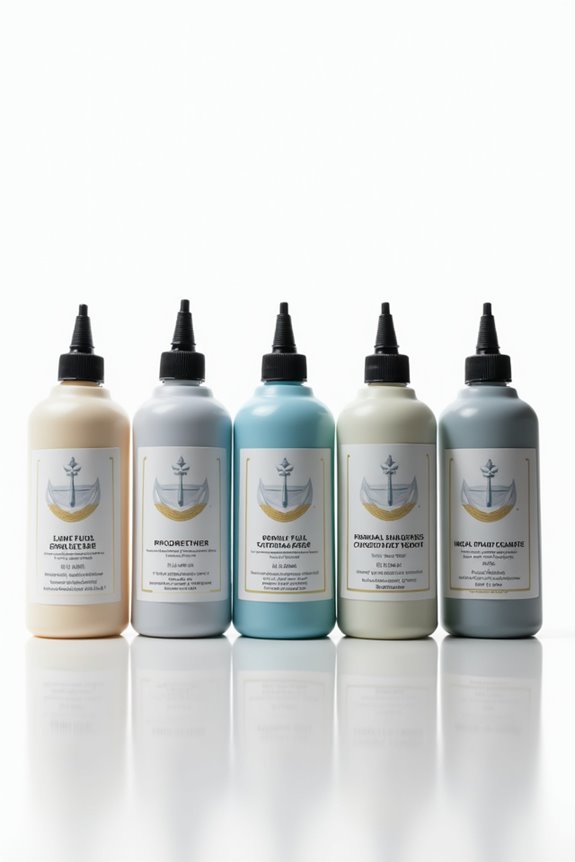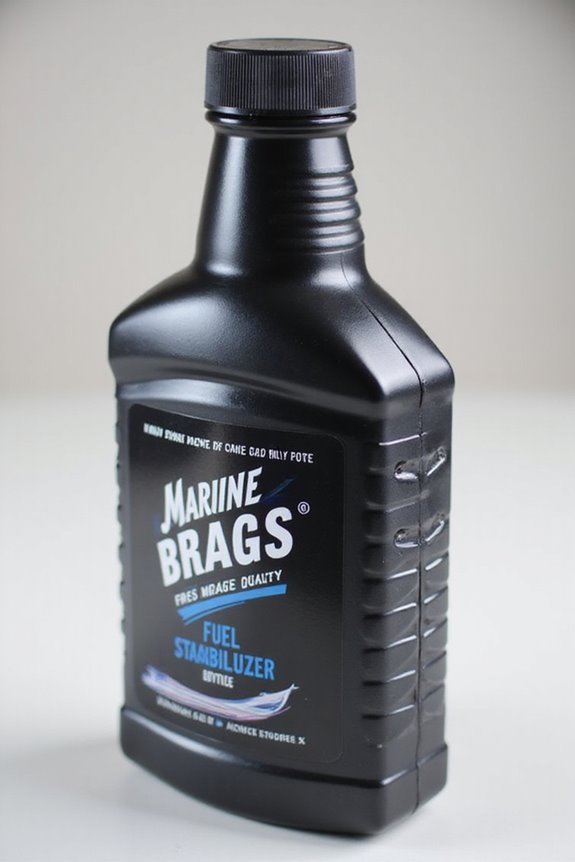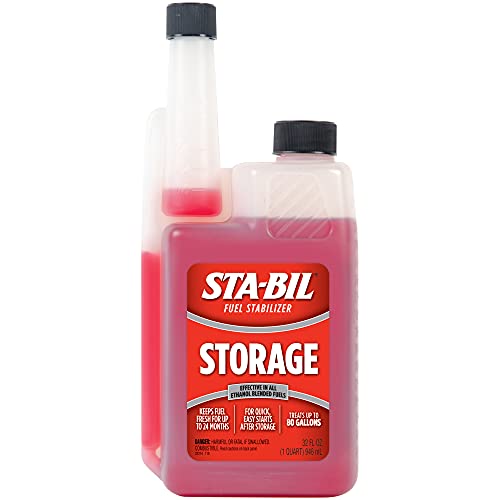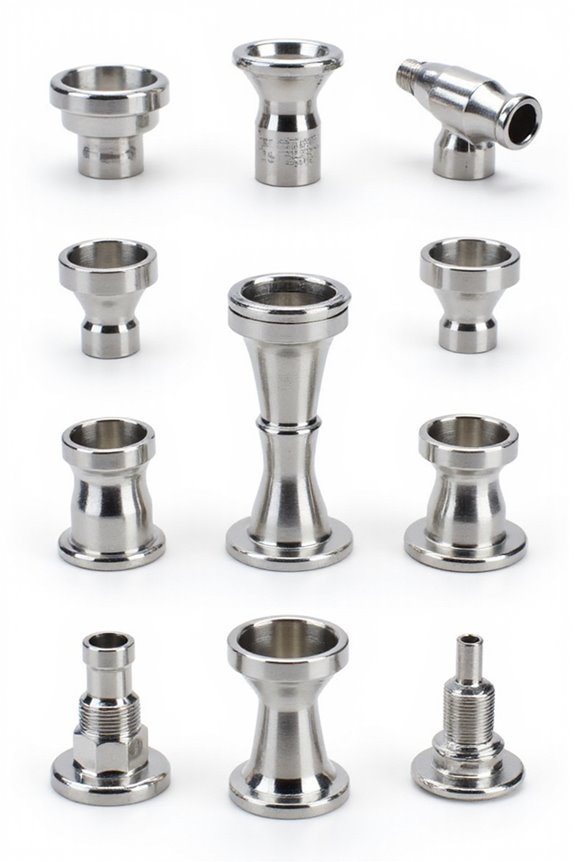As an Amazon Associate, we earn from qualifying purchases. Some links may be affiliate links at no extra cost to you. Although our opinions are based on curated research, we haven't used these products. Articles generated with AI.

The 5 Best Fuel Stabilizers for Marine Engines: Keep Your Boat Running Smoothly
When it comes to keeping your boat running smoothly, you’ll want to check out the Sea Foam Marine PRO, STAR BRITE Star Tron, Yamaha’s Yamalube, Star Tron Small Engine Formula, and STA-BIL Storage Stabilizer. These products tackle fuel aging, prevent corrosion, and boost performance, keeping your engine happy and healthy. Plus, some can keep fuel fresh for up to two years! Want to know what makes each of these stabilizers stand out? Stick around for the full scoop!
Key Takeaways
- Sea Foam Marine PRO stabilizes fuel for up to 2 years, cleans injectors, and prevents corrosion, ideal for seasonal storage.
- STAR BRITE Star Tron enhances performance and fuel economy, stabilizing fuel for 2 years and addressing ethanol-related issues.
- Yamaha OEM Yamalube ensures quality for specific models, maintaining cleanliness and preventing storage problems during winter.
- STA-BIL Storage Stabilizer protects against corrosion and improves engine reliability, effective for up to 24 months after application.
- Regular use of stabilizers like Star Tron Small Engine Formula ensures smooth operation and prevents ethanol issues in small engines.
Sea Foam Marine PRO Marine Fuel System Treatment MP20, 20 oz
Sea Foam Marine PRO Marine Fuel System Treatment MP20, 20 oz
- Marine PRO is a complete marine fuel system treatment that helps your marine engine run smoother and last longer.
- Add to fuel to clean fuel injectors and carburetor jets. Cleans and lubricates critical upper engine areas.
- Helps reduce long-term engine wear. Helps prevent corrosion caused by ethanol and water.
When it comes to keeping your marine engine in tip-top shape, the Sea Foam Marine PRO Marine Fuel System Treatment MP20, 20 oz is a game-changer. This exceptional fuel treatment cleans fuel injectors and carburetor jets, helping your engine run smoother. Plus, it’s compatible with all 2- and 4-stroke gasoline marine engines—no worries there! With its ability to lubricate upper cylinders and prevent pesky corrosion from ethanol, you’ll be setting yourself up for long-term success. Want your boat to hum like a dream every time you hit the water? Sea Foam’s got your back for the ride ahead!
Best For: Those seeking to improve engine performance, prolong the life of their marine engine, and maintain fuel system cleanliness in 2- and 4-stroke gasoline marine engines.
Pros:
- Cleans and maintains fuel injectors and carburetor jets for improved fuel flow and engine efficiency.
- Protects against corrosion caused by ethanol and moisture, extending engine life.
- Stabilizes fuel for up to 2 years, making it ideal for seasonal marine storage.
Cons:
- Some users may find it a bit pricey compared to other fuel treatments.
- Effectiveness can vary based on the condition of the engine and its previous maintenance history.
- Requires regular use for optimal results, which may be a hassle for some boat owners.
STAR BRITE Star Tron Enzyme Fuel Treatment (32 Fl. Oz.)
STAR BRITE Star Tron Enzyme Fuel Treatment - Concentrated Formula 32 Fl. Oz. – Treats up to 512...
- ALL-ROUND ENGINE SOLUTION - Works in all engines and all fuels, making it the ideal fuel treatment and stabilizer for any vehicle or gas powered tool
- ETHANOL PROBLEM SOLVER - Prevents and cures most ethanol-related issues, including poor performance and decreased fuel economy
- OLD FUEL REVITALIZER - Stabilizes fuel up to 2 years and can help rejuvenate old, sub-spec fuel, even after months of inactivity
If you’re a boat owner looking to keep your marine engine in top shape, STAR BRITE Star Tron Enzyme Fuel Treatment is a game changer. This concentrated 32 oz. formula treats up to 512 gallons of gasoline, making it perfect for your vessel or gas-powered tools. It prevents and cures ethanol-related issues, boosting performance and fuel economy. Plus, with the ability to stabilize fuel for up to two years, you won’t have to worry about that old, stale gas when you’re ready to set sail. And the best part? You can mix it with other additives without any measuring fuss. Give it a try!
Best For: boat owners and anyone using gas-powered tools looking to enhance engine performance and prevent fuel issues.
Pros:
- Acts as a fuel stabilizer, prolonging the shelf life of gasoline for up to 2 years.
- Enhances performance by preventing gum and varnish build-up, improving fuel economy.
- Compatible with all engine types and fuel additives for easy use.
Cons:
- May not be effective for severe fuel system issues that require professional attention.
- Some users may prefer a larger size for long-term use.
- Results may vary based on engine condition and usage.
Yamaha OEM Yamalube Outboard Fuel Stabilizer & Conditioner Plus
Yamaha Yamalube Outboard Fuel Stabilizer & Conditioner Plus- 12 ounce, #ACC-FSTAB-PL-12
- Message us with VIN/HULL for fast fitment verification
- Item only fits specific models listed; The picture could be generic
- New OEM YAMAHA Fuel Stabilizer Plus
Looking for a reliable fuel stabilizer for your marine engine? The Yamaha OEM Yamalube Outboard Fuel Stabilizer & Conditioner Plus is a genuine Yamaha product that’s designed to keep your engine running smoothly. Weighing in at just 12.8 ounces, it’s easy to handle and store. With a customer rating of 4.7 out of 5 stars, it’s no wonder boaters rave about its ability to maintain fuel system cleanliness and prevent storage issues. Plus, it’s engineered specifically for certain models, ensuring a perfect fit. So, whether it’s winter storage or just routine maintenance, this stabilizer’s got your back!
Best For: Boat owners looking for a reliable solution to stabilize fuel and maintain engine performance during storage.
Pros:
- Genuine Yamaha product ensures high quality and compatibility with specific models.
- Effective in preventing fuel system issues and maintaining cleanliness during long-term storage.
- Highly rated by users with an average rating of 4.7 out of 5 stars, indicating customer satisfaction.
Cons:
- Limited to specific models, requiring users to verify fitment via VIN/HULL.
- Not an aftermarket option, which may be a drawback for those seeking cheaper alternatives.
- Availability may vary, with a best sellers rank indicating moderate market presence.
Star Tron Enzyme Fuel Treatment – Small Engine Formula (16 Oz)
Star Tron Enzyme Fuel Treatment - Small Engine Formula - 16 Oz Treats up to 96 Gals, Gas Additive...
- UNLEASH YOUR ENGINE'S FULL POTENTIAL - Star Tron Enzyme Fuel Treatment uses advanced enzyme technology to ensure all engines start easily and run smoothly, even after...
- SAY GOODBYE TO ETHANOL-RELATED PROBLEMS - Prevents and cures most ethanol-related issues, including poor performance, rough idling, and decreased fuel economy, giving you...
- MAXIMIZE FUEL ECONOMY - By removing and preventing gum, carbon deposits, and varnish build-up, Star Tron keeps your fuel delivery system clean, resulting in improved fuel...
Star Tron Enzyme Fuel Treatment – Small Engine Formula (16 Oz) is your go-to solution for keeping marine engines running smoothly, especially those like your boat or personal watercraft that may sit idle for months. This handy fuel treatment rejuvenates and stabilizes up to 96 gallons of gasoline, ensuring easy starts and smooth operation after extended downtime. Thanks to its advanced enzyme technology, you can say goodbye to poor performance and those pesky ethanol issues. Just mix 1 fl. oz. per 3 gallons of gas, and you’re good to go. With Star Tron, you’ll feel like a nautical genius!
Best For: Those seeking to improve the performance and longevity of small engines, particularly in marine applications, which may experience inactivity for extended periods.
Pros:
- Enhances engine performance by preventing ethanol-related issues and ensuring smooth operation.
- Stabilizes fuel for up to 2 years, making it ideal for seasonal use in boats and other recreational vehicles.
- Effective across a wide variety of engine types and fuel blends, promoting versatility and compatibility.
Cons:
- Requires regular use and correct dosing for optimal results, which may be inconvenient for some users.
- May have limited availability in physical stores compared to larger chain retailers.
- Some users may find the cost higher compared to standard fuel additives without enzyme technology.
STA-BIL Storage Fuel Stabilizer (32 oz.)
STA-BIL Storage Fuel Stabilizer | Keeps Fuel Fresh for 24 Months, Prevents Corrosion, Gasoline...
- Replaces: Cub Cadet 22216, 22287
- Corrosion protection to help prevent and protect against problems caused by ethanol-blended fuels
- Used in 2-cycle and 4-cycle engines
When it comes to keeping your marine engine in tip-top shape during off-seasons or long storage periods, the STA-BIL Storage Fuel Stabilizer (32 oz.) is a must-have. This handy product treats up to 80 gallons of fuel, ensuring your engine’s ready to go when you are. Just add 1 ounce to every 2.5 gallons of fresh fuel—it’s as simple as that! Plus, it delivers corrosion protection, particularly for those pesky ethanol-blended fuels. With a shelf life of up to 24 months after opening, you’ll wonder how you ever stored your boat without it. Happy boating!
Best For: Those looking to protect and maintain the performance of their marine and small engines during long storage periods.
Pros:
- Corrosion Protection: Prevents damage from ethanol-blended fuels, ensuring engine longevity.
- Easy Application: Simple measurement and addition process makes it user-friendly.
- High Satisfaction: Highly rated by users for improved engine performance and reliability.
Cons:
- Limited Shelf Life: Effective only for up to 24 months after opening.
- Requires Engine Run Time: Needs the engine to run for 5 minutes post-application to effectively treat the fuel system.
- Specific Fuel Treatment: Only suitable for gasoline and ethanol-blended fuels, not for diesel engines.
Factors to Consider When Choosing Fuel Stabilizer for Marine Engines

When you’re picking a fuel stabilizer for your marine engine, a few important points can make all the difference. Have you thought about your engine’s compatibility, how long you need the fuel stabilized, and whether corrosion prevention features matter? It’s like choosing a boat buddy—make sure they enhance your performance and are up for the trip!
Engine Compatibility Requirements
Choosing the right fuel stabilizer for your marine engine isn’t just a toss-up; it’s about compatibility and specific needs. You’ll want to guarantee the product works with both 2-stroke and 4-stroke engines—some aren’t versatile and can leave you in a lurch. Also, don’t forget to check if it’s safe for inboard and outboard engines. That’s critical!
And what about dosage? Verify that the stabilizer matches your fuel tank size to avoid under-treating—like trying to fill a big boat with a thimble!
Lastly, pick a stabilizer that fights corrosion from ethanol and water, which are notorious for causing issues. Remember, a compatible stabilizer keeps your engine smooth, so you can focus more on fun and less on repairs!
Fuel Stabilization Duration
Let’s talk about fuel stabilization duration—it’s a key factor in keeping your marine engine running smoothly! When you’re choosing a fuel stabilizer, check how long it keeps your fuel fresh. Most products range from 2 months to a remarkable 2 years. For marine engines, some stabilizers are specially designed to fend off degradation during long storage, which is a lifesaver if you’re not out on the water every week. Remember, things like temperature changes and humidity can mess with effectiveness, too. So, if your fuel has ethanol, that’s another reason to pay attention to stabilization time. A good stabilizer can help reduce phase separation and degradation, making your engine’s performance a lot more reliable when you finally do set sail!
Corrosion Prevention Features
Understanding the corrosion prevention features of fuel stabilizers can make a world of difference for your marine engine. With moisture and ethanol lurking in your fuel like uninvited guests, ignition problems and rust are bound to happen. You want a stabilizer that includes additives forming a protective barrier against that nasty corrosion, right? Look for those that offer up to two years of solid protection when stored properly—it’s like insurance for your engine! Regularly using these stabilizers helps maintain the integrity of metal surfaces and keeps your fuel system clean. Trust me; saving on costly repairs and replacements makes choosing a fuel stabilizer worth it. So, why risk it? Keep your engine happy and running smoothly!
Performance Enhancement Attributes
When you’re out on the open water, the last thing you want is your engine sputtering or failing to start—you know what I mean? That’s where performance-enhancing fuel stabilizers come into play. They can tackle ethanol issues, giving your engine that needed boost. Imagine removing pesky gum and varnish build-up, which not only helps your engine run smoother but also improves fuel economy. Some stabilizers can even revive old fuel, making it burn more efficiently. Plus, if you choose the right one, you might notice less wear on your engine components, leading to a longer lifespan. So, whether you’re cruising or just sitting idle, a good stabilizer means easy starts and happy boating days!
Treatment Volume per Gallon
Choosing the right fuel stabilizer for your marine engine isn’t just a matter of grabbing the first bottle you see—after all, it can mean the difference between smooth sailing and frustration on the water. One key factor to take into account is treatment volume per gallon. Some stabilizers require just 1 ounce for 2.5 gallons, while others cover a whopping 512 gallons in larger containers. Knowing your fuel tank capacity and how much a stabilizer treats is essential. You wouldn’t want to overspend on excess stabilizer or compromise on effective fuel stabilization. Plus, some products promise to keep your fuel fresh for up to two years—so make sure you choose wisely for those long off-season storage times!
Ease of Use
One of the top factors to evaluate when picking a fuel stabilizer for your marine engine is how easy it is to use. You want clear dosage instructions—no one likes measuring by guesswork, right? Look for products with built-in measuring caps or visual indicators; they help avoid overuse, ensuring accuracy. Also, consider stabilizers that don’t need special tools for mixing; simplicity is key in a marine environment. It’s a bonus if the stabilizer can safely mix with other additives—who doesn’t love that multitasking magic? Finally, user-friendly packaging can make all the difference; after all, when you’re on the water, the last thing you want is a complicated application process. Keep it simple, and enjoy your time on the waves!
Environmental Impact Considerations
You may not realize it, but the choice of fuel stabilizer actually plays a big role in how your marine engine affects the environment. Ethanol-blended fuels can cause phase separation, wreaking havoc not just on your engine but also on local water bodies. By picking a stabilizer designed to reduce emissions, you’ll help keep our air fresher—those fish will thank you! Plus, a good stabilizer can prevent corrosion, minimizing the chances of harmful contaminants leaching into the water. And let’s not forget about fuel economy; every drop saved lowers your carbon footprint. Choosing an alcohol-free, biodegradable stabilizer? Now that’s like giving a high-five to Mother Nature! It’s an easy step toward a greener boating experience.
Price and Availability
When it comes to picking the right fuel stabilizer for your marine engine, price and availability can really make a difference, especially if you’re on a budget or in a hurry to get your boat ready. Prices can range from about $10 to over $30, so you’ll want to shop around. Don’t forget to check comparative prices at marine supply stores, auto retailers, and online platforms—some folks might even get lucky with seasonal discounts! If you’ve got a larger tank, consider concentrated formulas that treat more fuel, potentially saving you money in the long run. So, why not snag your stabilizer before summer hits? You wouldn’t want to end up with “oh no!” moments later on, right?
Frequently Asked Questions
How Often Should I Use Fuel Stabilizer in My Boat?
Wondering how often you should use fuel stabilizer in your boat? It’s as essential as sunscreen on a sunny day! You should add it every time you fill up, especially if you’re planning to store your boat for a while. Fuel stabilizers prevent gumming and guarantee peak engine performance. So, don’t skip this step! Trust me, your boat will thank you when it sails smoothly with no hiccups down the line.
Can Fuel Stabilizers Be Used With All Types of Fuels?
You might wonder if fuel stabilizers work with all types of fuels, right? Generally, yes! Most are great for gasoline and diesel, making them pretty versatile. However, some stabilizers are specifically designed for ethanol-based fuels, so it’s best to check the label. You wouldn’t want your fuel to feel left out! Just remember, using the right stabilizer can keep your engine happier and running smoothly, which is what we all want!
Are Fuel Stabilizers Safe for the Marine Environment?
Are fuel stabilizers safe for the marine environment? Absolutely, if you choose the right ones! Most quality stabilizers are specifically formulated to minimize their impact. They help prevent fuel breakdown which can lead to unwanted emissions, kinda like cleaning up a mess before it happens. Just remember to follow the manufacturer’s instructions. You wouldn’t want to toss in something that’s not eco-friendly, right? Keeping your boat and the ocean happy is totally doable!
How Long Does Fuel Stabilizer Last Once Added to Fuel?
Once you add fuel stabilizer, it can last up to 12 months, depending on the product. However, you’ll want to check the label, as some might have different longevity claims. Isn’t it great knowing your fuel’s got a protective buddy? Just remember, it won’t magically revive super-old fuel, so it’s best to use it before things go bad. Keep your tank fresh, and your engine will thank you later!
What Are the Signs of Fuel Degradation in Marine Engines?
Picture your fuel like a vibrant garden; it needs tending. If you notice sluggish engine starts, unusual sounds, or a rough idle, that could signal fuel degradation. You might even see a cloudy appearance, like a foggy day in your garden! Don’t forget that foul odors can rear their heads too. It’s essential to keep an eye out—after all, you wouldn’t want your boat’s power to wilt away, right?









